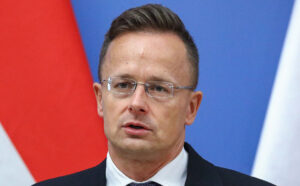
Hungary has decided to block the allocation of a EUR90 billion EU loan to Ukraine until oil transit to Hungary via the Druzhba pipeline is resumed, Hungarian Foreign Minister Péter Szijjártó said.
On Friday evening, he again accused Ukraine on social media of allegedly blackmailing Hungary by stopping oil transit in coordination with Brussels and the Hungarian opposition in order to create supply disruptions in Hungary and raise fuel prices ahead of the elections.
According to Szijjártó, Ukraine is violating the Association Agreement with the EU.
As reported with reference to Ukrtransnafta, as a result of a targeted Russian attack on January 27, significant damage was caused to the technological and auxiliary equipment of the Druzhba oil pipeline.
“Currently, work is underway at various stages to detect defects, stabilize the technical condition of the system, and eliminate the consequences of the hostile attack. Emergency repair work is being carried out with the involvement of specialized technical units and specialized equipment,” the company said in an official comment to Interfax-Ukraine on February 19.
Hungary and Slovakia stopped supplying diesel fuel to Ukraine on February 18 until the transit of Russian oil through the Druzhba pipeline is restored.
The European Commission, in turn, convened a meeting of the oil coordination group on February 25 in connection with the suspension of supplies to Hungary and Slovakia due to Russia’s damage to the Druzhba oil pipeline.

Housing prices in Hungary rose by 17.5% year-on-year in January 2026, according to data from the ingatlan.com classifieds portal. In Budapest, the increase was even higher – 20.4% y/y, while prices across the country rose 1.7% m/m and in the capital – 2.9% m/m.
In Budapest, one of the most “massive” districts in terms of supply, District XIII, showed an average price of around HUF 1.62 million per square meter in January, which is equivalent to approximately EUR 4,300 at the ECB exchange rate (EUR 1 = HUF 379.88 as of February 12, 2026). In the premium District V, the median price exceeded HUF 2.04 million per square meter (approximately EUR 5,400).
Price growth was also observed outside the capital. In Debrecen, the country’s second-largest city, the level reached about HUF 1.07 million per square meter (approximately EUR 2,800), while the lowest values among administrative centers were recorded in Szalgótarján, at around HUF 339,000 per square meter (about EUR 0,900).
Hungary’s data fits into the overall European picture of accelerating prices, but with a noticeable “overheating” relative to its neighbors. According to Eurostat calculations, in the third quarter of 2025, Hungary showed the highest growth in housing prices in the EU – +21.1% y/y (followed by Portugal and Bulgaria).
Among the factors supporting demand, market participants and economic observers highlight government incentives for buyers. In particular, the Hungarian government announced a program to support first-time home buyers with interest rate subsidies (preferential loans), which, according to the authorities, could become a significant budget item in the coming years.
An additional “booster” for the dynamics in euro terms was the currency component: in 2025, the Hungarian forint strengthened significantly against the euro (in particular, according to Hungarian media estimates, by approximately 6.2% in the first ten months of the year), which makes price growth more noticeable for settlements in euros.

Ukrzaliznytsia (UZ) has sent its first container train along the Lviv–Fenishlitke (Hungary) route, according to the company’s press service.
According to the report, the project was implemented by a subsidiary of UZ Cargo Poland, a branch of the Lisky Transport Service Center, and a private Hungarian logistics terminal.
Sun Smart Logistics technologies and equipment and modernized platforms of the Lisky Transport Service Center were used for loading on 1520 mm gauge tracks. At the terminal in Fenishlitke, semi-trailers will be reloaded using R2L technology onto T3000 platforms for further travel on 1435 mm gauge tracks. Thanks to the modernized platforms and special technologies, the semi-trailers were loaded without the use of tractors and cranes.
“This trip confirms the efficiency and versatility of containerized transportation of semi-trailers of any type between Ukraine and European Union countries using 1520 and 1435 mm gauges,” Ukrzaliznytsia concluded.

Hungary became the EU leader in terms of housing price growth: in the third quarter of 2025, residential property prices there rose by 21.1% year-on-year, according to Eurostat data.
Overall, housing prices in the EU, as measured by the House Price Index, rose by 5.5% in July-September 2025 compared to the same quarter in 2024, and by 5.1% in the eurozone. Compared to the second quarter of 2025, growth was 1.6% in both the EU and the eurozone.
Eurostat notes that among the EU countries for which data is available, only Finland (-3.1%) recorded an annual decline in prices, while the rest saw growth. Apart from Hungary, the most significant price increases were recorded in Portugal (+17.7%) and Bulgaria (+15.4%).
Source: http://relocation.com.ua/hungary-showed-the-highest-growth-in-housing-prices-in-the-eu/

Passenger traffic across the Ukrainian border in the third week of December, from December 13 to 19, jumped by 26.3% to 562,000 as Christmas approached, and this weekend the increase reached 50%, causing queues at the border with Poland, Hungary, and Slovakia, according to data from the State Border Service.
According to them, the number of border crossings for departure increased to 279,000 from 226,000 a week earlier, while the increase for entry was even more significant – to 283,000 from 219,000.
This Saturday, December 20, the number of border crossings for exit and entry was also similar – 62,000 and 63,000, compared to 41,000 and 39,000, respectively, on the previous Saturday.
The number of vehicles that passed through checkpoints this week also jumped to 140,000 from 123,000 a week earlier, while the flow of vehicles carrying humanitarian cargo remained at around 520.
According to the State Border Service, as of 12:00 on Sunday, there were no queues at the border with Romania and Poland, while at the borders with three other countries, there were queues at all checkpoints.
At the border with Poland, most passenger cars and buses were waiting to cross at the Krakovets checkpoint – 150 and 20, respectively. The queue at the Ustyluh checkpoint consisted of 125 cars and 15 buses, at the Rava-Ruska checkpoint – 110 cars, Smilnytsia checkpoint – 85 cars and 6 buses, Shehyni checkpoint – 80 cars and 19 buses, Hrushev checkpoint – 80 cars and 9 buses, Nizhankovychi checkpoint – 80 cars and 1 bus, Ugrinov checkpoint – 75 cars and 9 buses, Yagodin checkpoint – 30 buses (passage of passenger cars is temporarily suspended).
Forty passenger cars and two buses were waiting to cross the border with Slovakia at the Uzhgorod checkpoint, and 30 cars were waiting at the Maly Berezny checkpoint.
At the border with Hungary, the longest queues were at the Luzhanka and Dzvinovo checkpoints, with 50 and 45 cars, respectively. There were 30 cars at the Kosino and Vilok checkpoints and 5 at the Tisa checkpoint.
The total number of border crossings this week is slightly lower than last year. At that time, 294,000 people left Ukraine and 290,000 entered the country over the same 7 days, although the flow of cars was lower – 134,000.
Last year, a 28.1% jump in passenger traffic was recorded this week, and the following week it increased by another 12.5%.
As reported, from May 10, 2022, the outflow of refugees from Ukraine, which began with the start of the war, was replaced by an influx that continued until September 23, 2022, and amounted to 409,000 people. However, since the end of September, possibly influenced by news of mobilization in Russia and “pseudo-referendums” in the occupied territories, followed by massive shelling of energy infrastructure, the number of people leaving has exceeded the number of people entering. In total, from the end of September 2022 to the first anniversary of the full-scale war, it reached 223,000 people.
During the second year of full-scale war, the number of border crossings to leave Ukraine, according to the State Border Service, exceeded the number of crossings to enter by 25,000, during the third year by 187,000, and since the beginning of the fourth year by 203,000.
As Sergei Sobolev, then Deputy Minister of Economy, noted in early March 2023, the return of every 100,000 Ukrainians home results in a 0.5% increase in GDP.
In its July inflation report, the National Bank worsened its migration forecast: while in April it expected a net inflow of 0.2 million people to Ukraine in 2026, it now forecasts a net outflow of 0.2 million, which corresponds to the estimate of the net outflow this year. “Net return will only begin in 2027 (about 0.1 million people, compared to 0.5 million in the previous forecast),” the NBU added and confirmed this forecast at the end of October. In absolute terms, the National Bank estimates the number of migrants currently remaining abroad at about 5.8 million.
According to updated UNHCR data, the number of Ukrainian refugees in Europe as of December 11, 2025, was estimated at 5.311 million (5.331 million as of November 14), and 5.860 million (5.850 million) worldwide.
In Ukraine itself, according to the latest UN data for July this year, there are 3.340 million internally displaced persons (IDPs), compared to 3.757 million in April.

Imports of insulated wires and cables to Ukraine in January-November 2025 increased by 27.8% compared to the same period in 2024, reaching $541.5 million, according to the State Customs Service. In November of this year, imports of these products increased by 23.6% compared to November 2024, reaching $46.3 million, which is 22.6% higher than in October 2025.
Hungary was the largest supplier of wires and cables to the Ukrainian market in January-November, with a volume of $143.1 million (26.4% of imports). China ranks second with $116.7 million (21.6%), followed by Poland with $88.9 million (16.4%). In 2024, the main volumes were imported from Hungary ($120 million), Poland ($74.4 million), and China ($66.3 million, respectively).
According to State Customs Service data, at the end of 2024, imports of insulated wires and cables to Ukraine increased by 9.3% compared to 2023, to $475 million, while exports increased by 60.2%, to $1.275 billion.